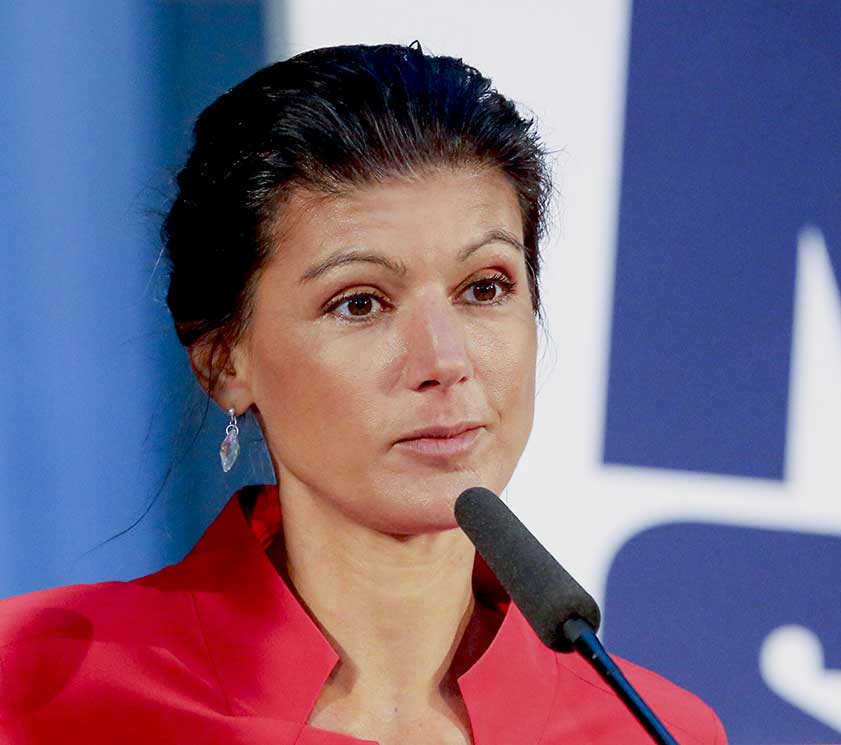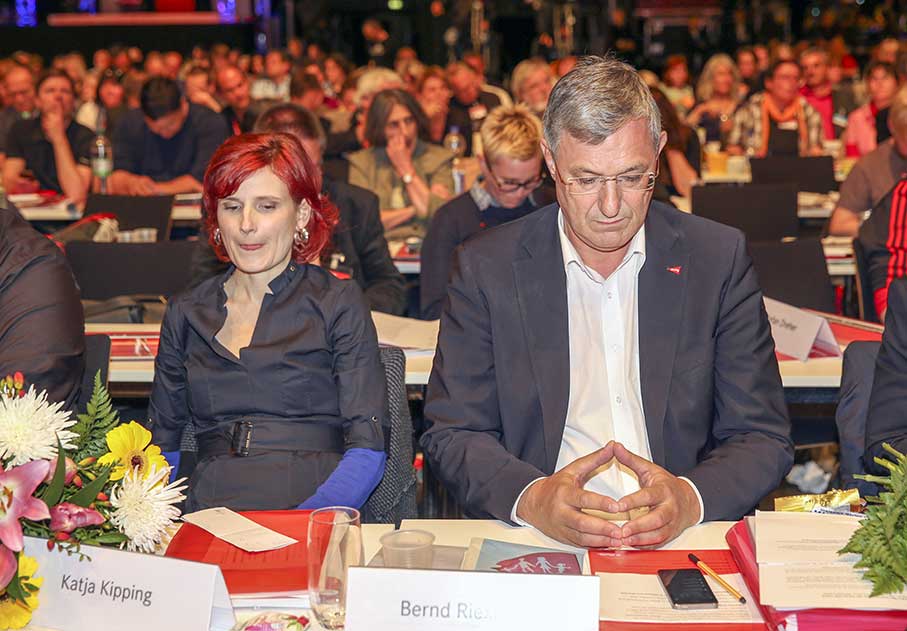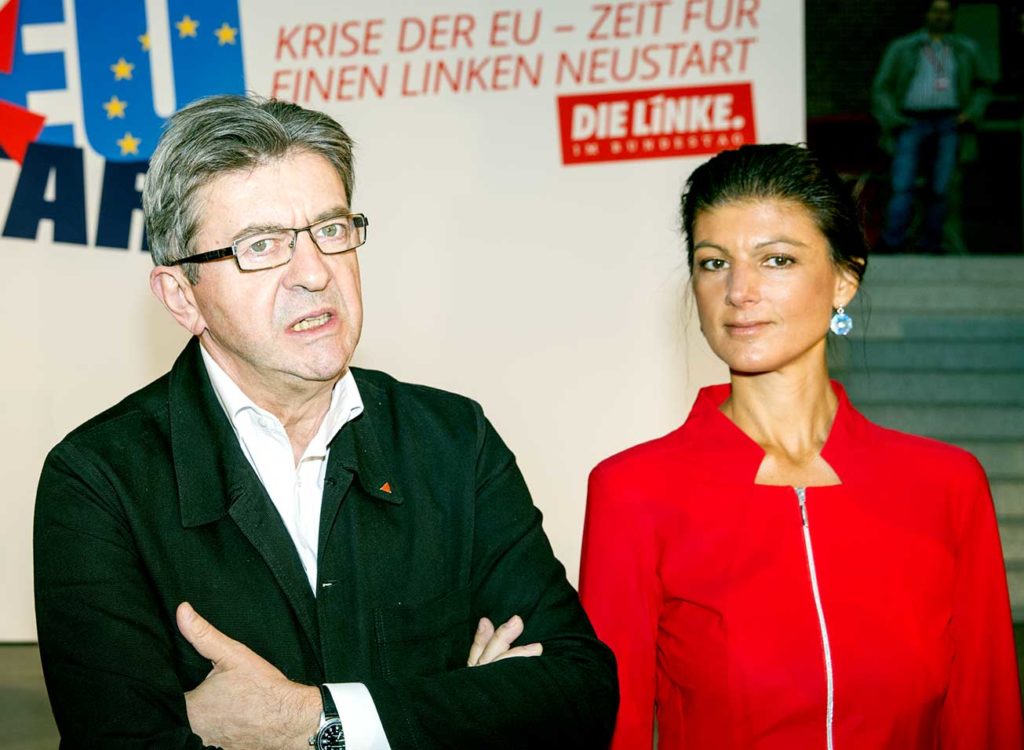The Left party (DIE LINKE.) in Germany builds up to its annual conference in Leipzig starting June 8th, 2018.
The various battle lines are still vague and opaqueness prevails but momentum is building for a number of clashes at the forthcoming national conference. This could be the most significant watershed for the Linke (DIE LINKE.), or the party could suppress the internal festering again for another year.
Will Wagenknecht take control?
The main confrontation, about which few activists now speak, was the rumoured contest for the party leadership. The incumbents of the split post, Katja Kipping and Bernd Riexinger, have stumbled along for six years already, somehow holding the party together, presiding over the demise of the party in the former East with some exceptions, and benefitting from a new spark of life in the former West. A challenge was rumoured to be mounting from Sahra Wagenknecht who is originally from the East and has enjoyed a model career in the party. Wagenknecht seems to have abandoned her radicalism and become more comfortable with the Reformers (see below Reformers) in the party since she personally paired up with ex-Social-Democrat (SPD) minister Oskar Lafontaine, and co-chaired the parliamentary group of the party with Dietmar Bartsch who is a leading figure in the social-democratic right flank of the party, the FDS (“Forum Demokratischer Sozialismus”, see Reformers below). Whether or not she mounts a challenge for the leadership, and with which, if any, running partner, remains to be seen.
Traditionally Wagenknecht’s base in the party was the hard left, but her recent repeated remarks about limiting migration and forming a new left movement, portraying more or less the same views as the Reformers, has rapidly lost her some of her former supporters and left the rest insecure. Whilst Wagenknecht’s history has shown that she is a force to be reckoned with, it is clear from her recent manoeuvres that she is again repositioning herself politically and risks losing her base from which she spring-boarded herself into the national limelight. The most significant group in her youth was the Communist Platform (KPF – the KPF is mainly composed of prolific Marxists, GDR left-overs, pacifists and other systematic thinkers).
The conference next week will also elect its new executive committee and the Reformers have nominated candidates for key posts in the party like treasurer, general secretary, and vice-chairs etc. The Reformers have also tabled a number of motions to the forthcoming conference. The most significant motion from the strongest reformers, the FDS, is an attempt to establish a select commission, in which they hope they would have an inbuilt majority, to review and change the programme of the party. Probably, they will move to get this referred to the party’s executive committee where they think they will have a majority so that they can push their changes through without interference from the members. It is typical for the FDS, at least in the former East, to create an “authority” – a committee, commission or a select group at a higher level, then bully and mob themselves into the controlling positions and spring the ‘results’ on the rest of the party, without ever really making the content of their proposals transparent or tabling a straightforward motion to allow party members to discuss and vote on any proposed changes.
Wagenknecht’s career in the left has steadily developed up through the Linke party and she still has a number of good years before her. She is now on the highest plateau in the Linke and, given her record, will be unlikely to want to sit on her laurels. She faces three possible options: either to reconfigure the Linke and broaden its base to the right, or to formally leave the Linke and form a new party or at least a movement. The latter would be an attempt to outflank and include as much of the Linke and dissatisfied SPD members as possible in a Mélenchon style gambit to collect many “Social-Democrats” together to realign German politics and counter the long-term dominance of the right and to win back the many voters lost to the AfD. The third option is to leave things as they are, at least for another year or so.
Wagenknecht has recently reconfirmed her support for a new Coalition Movement (“Sammelbewegung” – rumoured to be “#fairLand”) and undoubtedly sees herself a one of the key figures in it. Apparently the Movement will be launched in September this year, after the football world cup (ARD 27.5.2018).
Wagenknecht may be very cautious about jumping ship as her husband Lafontaine tried this in 2005 with, at best, mediocre results, which led to his disappearance from the centre stage of the political arena. Lafontaine has been at the very top, rising to minister, party chairman and the SPD candidate for chancellor in 1990, and he was already past his political peak when he defected into a less prominent world. There is much room for Wagenknecht to go upwards in the German political world, to become, for example, a national minister or the Chancellor. However, although she has not directly ruled out candidating for the party leadership, she has implied that she will not. If she does candidate, she may well candidate on a joint ticket with Dietmar Bartsch to ensure the reformers are on board. To allow Riexinger to keep his post to pacify the SL (see below Reformers) – where Lafontaine enjoys the most resonance in the Linke – would suggest that Wagenknecht and Lafontaine have forgiven Riexinger for his alleged personal campaigns against Wagenknecht earlier this year, which is rather fanciful. Consequently, Bartsch is the only real candidate, if, and it is a big if, there is a contest.
Wagenknecht has skilfully repositioned herself over time to get where she is, and has run out of space in the Linke, and she is a politically maturer than the incumbent co-chairs. To abandon the Linke would also mean to directly confront not only the Linke itself, but also the SPD and probably also the AfD, and might well lead her to obscurity (unless deals with other parties are in the pipeline). To take control of the Linke, and then to relaunch and redefine it as a party is a safer course for her, although she risks embarrassment if she loses, and, if she wins, will then face the very significant problem of how to sell ‘New Linke’ as a new product rather than a simply a new flavour of the left.
Even though Mélenchon and his La France Insoumise could be an example for Wagenknecht to follow it does not translate easily into the German arena – there are fundamental differences between the German and French electoral systems and also the voters.
Firstly, Germans do not elect presidents, ministers or the chancellor directly. Consequently the appearance of independents at the higher levels of the political world in Germany is extremely rare indeed. Wagenknecht needs a party behind her. She is a career parliamentarian and her ego is not so big as to imagine that she could not only redirect the political direction of Germany but also fundamentally change the electoral system from the ‘bottom up’ in one fell sweep. About half the Bundestag is elected through a party list, and the vast majority of the direct candidates wear a party badge. Often the chancellor is agreed upon through horse-trading between the party groups in the Bundestag, and she or he appoints the cabinet based on what was agreed in the horse-trading rounds.
Secondly, Germans are very much authority orientated and democracy for them is simply getting a group of people to agree to something, whatever it might be. Parties give the aura of collectivity, authority and powerfulness to candidates, and to which parliament they are electing influences how people vote in Germany. Like everybody, Germans want their vote to count.
Thirdly in Germany, like France, money also plays a big role politics. To go it alone makes it more difficult to benefit from the state funding of political parties, at least until the Movement is recognised as an official party. And, although much smaller than the big German parties, the Linke has, officially, assets of at least 33 Million €, and an annual income of 30 Million € (2016). Wagenknecht’s journey upwards would be far more comfortable with at least some of these resources being available to her.
A parallel between the Movement and Corbyn’s revitalisation of Labour in the UK is often claimed by activists in the Linke, but the cases are very dissimilar. Corbyn attracted many former Labour members who had effectively exiled themselves from the party in a sulky protest against Blairism. And, although there were a few initiatives, like Respect, the majority of the exiled had not become members of other parties and were keen to re-join Labour. Corbyn inspired them to believe that ‘old Labour’ was re-emerging.
If Wagenknecht contends the leadership and wins it would certainly get her in the news next weekend, and it might generate enough attention to get more widespread support for the Movement. If she intends to side-step the party, the internal ulcerations will continue to cause major discomfort and further paralysis in the Linke for some time.
The Reformers
Two main groups form the reformist wing of the Linke: the FDS and the SL (“Sozialistische Linke”), even though they may not see themselves in this light. The reformers have, more or less, three main positions:
- They argue for limits on migration – they oppose the “no border, no nation” stance which often coexists with Marxist thinking.
- At the very best, they present some poorly considered, outdated Keynesian theories and seem to regard Germany as an economically isolated nation.
- As the name implies, they argue for some improvements in the capitalist system but present no fundamental critique – they want to make capitalism a bit nicer.
The SL position is best described as profering a nostalgic return to pre-neoliberal industrial capitalism, or Fordism, where workers participate more in the share of profits. The adoption of the neoliberal policies by the SPD and the consequent freeing up of the labour market and the slashing of unemployment benefits triggered Oskar Lafontaine and others to leave the SPD and later join the WASG (“Wahlalternative Arbeit und soziale Gerechtigkeit”). The WASG merged with DIE LINKE.PDS to form ‘Die LINKE.’ in 2007. The SL membership is dominated by people inherited into the Linke via the WASG. The SL, which targets unionised factory workers mainly in former West Germany, oppose unlimited migration because, in effect, it will ‘upset their differentials’ and lead to a brain drain in other countries. They talk trade-unionism high, and enjoy limited relationships with a few major trade unions in Germany. As the trade-unions in Germany are now in serious decline, the SL tries to extend their ‘customer base’ to include the service and care sectors and is home to Bernd Riexinger, the current male chair of the Linke.
The FDS is essentially an entryist group in the Linke, dominated by a minority of former East Germans who were refused membership of the SPD and people who later joined the Linke in order to further their career by, for example, becoming ministers. The FDS is the most Machiavellian and secretive of any group in the Linke and their mafia style tactics and Stalinist methods of control in the former East have already led to a haemorrhaging of members from the Linke, widespread apathy and a huge loss of their voter base to the newer protest party, the AfD. (Alternativ für Deutschland – the AfD is a populistic and nationalistic right-wing party whose rhetoric, perhaps oddly, seems occasionally to agree with Wagenknecht’s.) The tactics of the FDS and its closest associates smell like those of the secret service of the GDR – they operate by taking control through authority by seizing key posts and publications and then employing methods like bullying, mobbing, deleting members from the party lists, trying to forcibly remove members from meetings and denying ‘difficult’ elected delegates the right to participate at party conferences, etc. etc. – quite an uncivilised group of people, to say the least. New jobs in the party and in FDS controlled ministries are then given to FDS sympathisers. And so their network builds up. Spinning and Blairism are second nature to them and through their various strategies they have amplified their importance and power considerably. Possibly, they even have their own handshake. On the down side, they appear to have almost no political philosophy and when in office often readily adopt conservative or SPD policies without blinking an eye lid. Consequently, when the FDS takes over the party and participates in government, like in the former East, the Linke rapidly loses its credibility to its own voter base. Like all parasitoids, the FDS kills off its own host. It now appears to look for a new voter base, or ‘market’, to survive – time will tell whether it succeeds in attracting right-of-centre voter support. Although the Coalition Movement could become a new host for them, they are unlikely to jettison the Linke as they control most of its assets and resources. The FDS are almost a perfect example of Big Brother with a double helping of Doublespeak, but with little political ideology other than that ‘power is good’. They seldom win arguments, but often steal power.




